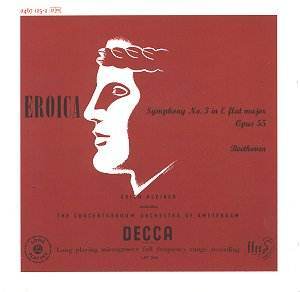Ludwig van
BEETHOVEN
Symphony no.3 in E flat, op.55 - "Eroica"
Symphony no.5 in C minor,
op.67
 Concertgebouw Orchestra,
Amsterdam/Erich Kleiber
Concertgebouw Orchestra,
Amsterdam/Erich Kleiber
 Decca 467 125-2 [77'
42"]
Decca 467 125-2 [77'
42"]
Crotchet midprice

Though recording history is strewn with Beethoven cycles which need never
have been made, there is nevertheless a select group of conductors who should
have set one down and didn't. Sir Adrian Boult is one, and Erich Kleiber
is definitely another.
This Fifth has always enjoyed cult status. At the end of the sixties it was
still in the catalogue at full price with its original LXT number, when mono
only recordings were almost extinct. Questioned why by the Guardian in
the course of a debate on LP pricing (plus ça change!) Decca
replied "because the EMG Art of Record Buying (does anyone remember
that cult?) recommends it as the best available recording". Questioned
in their turn, EMG admitted they hadn't sold a copy for years. It was deleted
within days and began a new life in mock stereo on a budget label. It has
rarely been out of the catalogue.
Yet "cult status" implies something rather exclusive, reserved for the few.
It is a fact that while certain conductors, Toscanini, Furtwängler,
Beecham, Klemperer in primis, have somehow imposed their names on
the collective consciousness of music lovers, as has indeed Kleiber's son
Carlos, partly through his two Viennese New Year's Day concerts, partly through
the myth which increasing non-appearance tends to generate. But the name
of Erich Kleiber has circulated mainly among those in the know. This in spite
of the almost unanimous critical opinion which considers his recordings of
Le Nozze di Figaro and Der Rosenkavalier as the finest ever
made.
So what are the characteristics of Kleiber's Beethoven? Lean textures, brilliant
articulation and a fanatical devotion to the letter of the score (though
he accepts some of Weingartner's rescorings and gives no more repeats than
was usual at that time - the first movement of the Fifth has its repeat,
but not that of the Eroica or the finale of the Fifth). Once he set
a tempo he stuck to it. In the slow movement of the Eroica he shows
up the vagaries of most other conductors, for he starts at a speed slightly
faster than usual, yet the subsidiary episodes come out slower than we are
used to. Few conductors, especially those who opt for a swift tempo, have
presented the first movement of the Fifth so entirely without a hint of an
unmarked rallentando in the famous four-note motive. Tempi are generally
exhilaratingly fast; an exception being the finale of the Fifth. This is
no doubt because Beethoven's metronome indicates a slower tempo to the half-bar
than that to the bar of the Scherzo. Most conductors take a faster tempo.
The Kleiber methods seem better suited to the Fifth than to the
Eroica. And here I must lodge a protest, for Decca have blazoned
"legendary 1953 performances" on the cover. This date is true of the Fifth,
which still sounds remarkably well, but the Eroica is from 1950, and
those three years make a lot of difference. The upper strings are shrill,
the bass-line poorly defined, there are some odd balances which are unlikely
to derive from the conductor, and the oboe has a terribly acidulous tone.
You can get used to it up to a point, but this is one for historically-minded
collectors. In this symphony the refusal to make points sometimes gives the
feeling, as in many modern performances on authentic instruments, that the
music is just being breezed through. You may protest in principal at the
way Furtwängler, during the secondary themes of the first movement,
practically grinds to a halt, gives great significance to the off-beat crotchet
chords and then makes a wild accelerando back to his original tempo. Kleiber
gives us what Beethoven wrote, but does he give us what Beethoven was trying
to say? There is some rather brusquely clipped phrasing at times and
the climax of the whole symphony, where the Prometheus theme rings
out on the horn, is too straight-jacketed to give the cathartic effect Klemperer
could draw out of it.
So, while not denying that Kleiber presents his point of view with enormous
conviction, perhaps in the last resort these are cult performances.
Every student of Beethoven interpretation should hear them, Decca should
issue their remaining Kleiber material without delay and a search through
European radio stations should be made for the missing symphonies (1, 4 and
8 if I am not mistaken). But, if Furtwängler or Klemperer were sometimes
"wrong" where Kleiber was "right", you get from them that sense of nobility
and humanity which are the qualities which make Beethoven speak to the man
in the street. Ultimately I don't find them here.
Christopher Howell
Performances

Recordings
 (Eroica),
(Eroica),
 (Fifth)
(Fifth)


